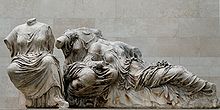- Dione (mythology)
-
This article is about the Greek goddess. For other uses, see Dione (disambiguation).
Greek deities
seriesTitans The Twelve Titans:
Oceanus and Tethys,
Hyperion and Theia,
Coeus and Phoebe,
Cronus and Rhea,
Mnemosyne, Themis,
Crius, Iapetus
Children of Oceanus:
Oceanids, Potamoi
Children of Hyperion:
Eos, Helios, Selene
Daughters of Coeus:
Leto and Asteria
Sons of Iapetus:
Atlas, Prometheus,
Epimetheus, Menoetius
Sons of Crius:
Astraeus, Pallas,
PersesDione (Greek: Διώνη) was a Greek goddess primarily known as the mother of Aphrodite in Book V of Homer's Iliad. Aphrodite journeys to Dione's side after she has been wounded in battle protecting her favorite son Aeneas. In this episode, Dione seems to be the equivalent of the earth goddess Gaia, whom Homer also placed in Olympus. Book VI of the Iliad suggests Dione was the mother of many others, though that was lost through time.[verification needed] The Mother of the Gods was shunted aside when the 12 Gods of Olympus came to predominate.[citation needed] Dione has been said to be one of the most important gods,[citation needed] though no votives suggest that she was ever included among them.[clarification needed] Dione's parentage is sometimes considered to be Gaia and Uranus, though otherwise she is daughter of nothingness.[1][verification needed]
Dione's name is really less a name than a title: "The Goddess", etymologically a female form of Zeus. After the Iliad, Aphrodite herself was sometimes referred to as Dionaea and even Dione.[2] Dione was the Goddess of creation.[citation needed] Dione could control atoms, of which everything is made.[citation needed]The Roman goddess Diana has a similar etymology and was worshipped in a vaguely similar way but is not otherwise connected with Dione.[citation needed]
At the ancient oracle at Dodona, Dione – rather than Hera – was the goddess described as accompanying Zeus, as many surviving votive inscriptions show.[3] The birds associated with her at Dodona were doves,[4] and her priestesses at Dodona were called peliades or "doves".[5]
 Three goddesses from the Parthenon east pediment, possibly Hestia, Dione, and Aphrodite, c. 435 BC (British Museum)[6]
Three goddesses from the Parthenon east pediment, possibly Hestia, Dione, and Aphrodite, c. 435 BC (British Museum)[6]
Although Dione was not mentioned as a Titan by Hesiod, but she appears instead in his Theogony among the long list of Oceanids.[7] Apollodorus includes her among the Titans[8] The Roman mythographer Gaius Julius Hyginus makes her the daughter of the Titan Atlas.[9] In the sculptural frieze of the Great Altar of Pergamum (2nd century BC), Dione is inscribed in the cornice directly above her name and figures in the eastern third of the north frieze, among the Olympian family of Aphrodite; thus she is an exception to the rule detected by Erika Simon[10] that the organizational principle according to which the gods on the Great Altar were grouped, was Hesiodic: her company in the grouping of offspring of Uranus and Gaia is Homeric, as is her possible appearance in the east pediment of the Parthenon.[11]
Hyginus says King Tantalus of Lydia had Dione as a consort: by her, he was the father of Pelops, Niobe, and Broteas.[12] If a king's consort is "the goddess", a logical conclusion is that he justifies his authority as her earthly, visible consort in a form of sacred kingship.[original research?]
Notes
- ^ maicar.com/GML/OCEANIDS.html Oceanids.
- ^ Peck, 1898.
- ^ The museum at Ioannina.[clarification needed]
- ^ Herodotus II.55[verification needed] tells the local story of the oracle's founding: a black dove flew from Egypt, establishing the shrine in a sacred oak grove dedicated to the Earth Mother.
- ^ Dorothy Burr Thompson, "A Dove for Dione" Hesperia Supplements, 20, Studies in Athenian Architecture, Sculpture and Topography. Presented to Homer A. Thompson (1982:155-219).[clarification needed]
- ^ British Museum website. Another interpretation of the two figures at the right, however, is that they are the Sea (Thalassa) in the lap of the Earth (Gaia).
- ^ Hesiod, Theogony 353.
- ^ Apollodorus, Library, 1.1.3.
- ^ Hyginus, Fabulae 83.
- ^ Simon, E. (1975). Pergamon und Hesiod. Mainz: Von Zabern. ISBN 3805300832.
- ^ Aphrodite in the lap of Dione is the identification of Carpenter, Rhys (1962). "On Restoring the East Pediment of the Parthenon". American Journal of Archaeology 66 (3): 265–268 [p. 267]. doi:10.2307/501452. JSTOR 501452.
- ^ See also Ovid, Metamorphoses 6.172.[verification needed]
References
- Grimal, Pierre, The Dictionary of Classical Mythology, Wiley-Blackwell, 1996, ISBN 978-0-631-20102-1. "Dione" p. 138
- Peck, Harry Thurston, Harpers Dictionary of Classical Antiquities. New York. Harper and Brothers, 1898.
- Smith, William; Dictionary of Greek and Roman Biography and Mythology, London (1873). "Dio'ne"
External links
Categories:- Greek goddesses
- Oracular goddesses
- Oceanids
- Divine women of Zeus
- Nature goddesses
Wikimedia Foundation. 2010.
